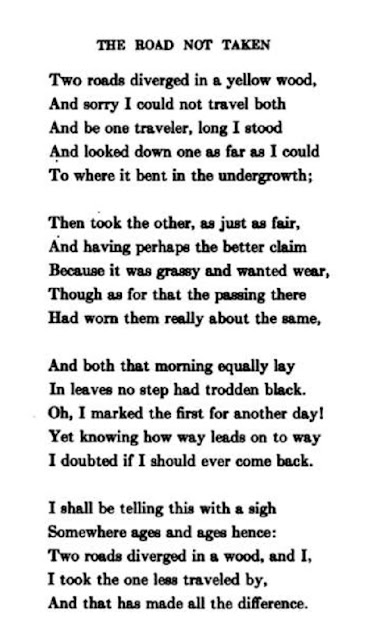Our Two Roads
There is a great deal of narrative in the world right now about how bad things are. Everywhere you turn you can find some news about escalating fuel prices, climate catastrophes, food shortages, and more. This is not to mention the enormous decline in social structures we've seen - even long before COVID. So there can't be any doubt that we're headed for something. But what, exactly?
Here's where I think there are two pathways. There is a divergent road here, and much like Mr. Frost's poem, we need to decide which path we are to take.
 |
| The Road Not Taken - by Robert Frost, from the Atlantic Monthly, courtesy of Wikipedia. |
The First Road
The first road is one that looks much like the one we are on now. It is the path that leads to tighter control mechanisms for a spiraling-out-of-control culture. It generates more and deeper legislation, with steeper punitive measures for non-compliance. It necessitates the need for lock-downs, and mandates marginalization of nearly all fringe groups through seemingly innocuous legislation disguised under warm and fuzzy words like "equality" and "justice." It continues raging about the need for change, all while nurturing the sick way-things-have-always-been, in attempt to describe the need for change without truly embracing any change at all. This is the road we are on now. We are very familiar with this road. It leads to devils we know.
The Second Road
The other road available is one not often taken - in fact, it may have no wear at all. I'm not sure anyone has traveled this road. But it presents itself there, diverging to the side, disappearing around some unknown bend up ahead. Should we see where it takes us? Dare we explore it?
There is no map for this road. It leads to lesser legislation, fewer restrictions, more freedoms for everyone, but not because a government mandates it. It unveils a restoring of nature, a natural (not forced) limitation on the use of fossil fuels, and a respite for the Earth. It also leads us to a respite for humankind, without a lack of resources.
This less-traveled road likely leads to collapse in some way. We may see our systems fail. We may need to learn to rely on one another more as humans - so communities may grow in more decentralized ways that what we're used to. We may need to rely on skill more than we rely on currency, so we will see re-development of some long-lost capacities among our developed communities. Food may not be available at every corner, so we may need to learn to rely on community resources for even basic things like dinner. We may have fewer "safety nets," so to speak - laws won't be available to make sure we're treated fairly except for when we interfere with profit. So we'll need to learn to deal fairly with ourselves and others.
This is a road we don't know. We can't say what would happen if we learned to love one another more - because we've never done it. We can't say what would happen if we had to learn to rely on people we don't know for very basic, immediate needs. We've never done that. But here's what might happen:
We might learn to finally get along. We might learn that skin color really is irrelevant. We might learn that cultures - in spite of their differences - have a lot in common, since we're all human to begin with. We might also learn that there is joy to be found in making a way all our own, and that reduced protection from reduced government carries risks, but also great rewards.

